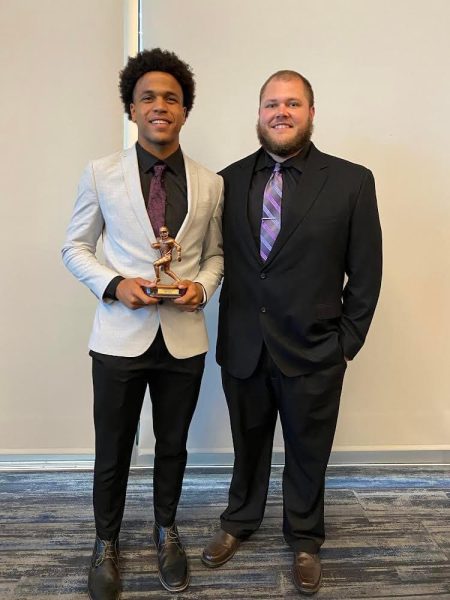Put the Rights in LGBT+
May 17, 2018
In a time when LGBT+ people have had the most visibility in society since Sappho of Lesbos and the two-spirits of the various Native American tribes, a world where access to information and a label designed to fit an individual is more accessible than ever, one’s rights as human beings are still being questioned and infringed upon. They are subjected to abuse, both physical and emotional, restricted on one’s freedoms based on others religious claims, and discriminated upon in the workplace. All people regardless of orientation deserve the same rights and protections.
ABUSE
Many people believe conversion therapy to be a relic of the past, that it no longer takes place in a ‘civilized society.’ What they don’t know is nearly 700,000 adults in the United States,have received conversion therapy at some point in their lives
RESTRICTION
The First Amendment is a polarizing topic in the fight for LGBT+ rights. The Supreme Court has had difficulty defining the limits of the protections outlined by the founders. Many opponents of the LGBT+ community have begun to use religious freedom to defend their restrictions on the LGBT+ community. Adoption has been caught in the cross-fire of this fight for civil rights. Gay adoption is legal in every state, but many religious adoption agencies have been forced to close due to non-discrimination statutes in state laws, such as a Catholic Charities branch in Massachusetts (Schaefer Riley). To combat the significant loss of agencies, some states have begun to grant immunity to the anti-discrimination laws to religious organizations. Other organizations that have quarreled with the LGBT+ community and the anti-discrimination laws is Alliance Defending Freedom (A.D.F.), a conservative religious liberty group spanning back to 1994. A.D.F. is known for bringing relatively small cases to the supreme court, such as a law limiting the size of church signs and a church seeking funding for a playground, but hopes to widen its sphere of influence by representing more well known cases, like the ongoing case of the Colorado baker who refused to make a cake for a gay wedding (Peters). The group has defended their actions as fighting for freedom of religion, “‘ We think that in a free society people who believe that marriage is between a man and a woman shouldn’t be coerced by the government to promote a different view of marriage — Jeremy Tedesco
DISCRIMINATION
The United States is no stranger to discrimination. Discrimination has been an issue in the states since explorers first tried to conquer them. Race, gender, income, and sexuality have all been used as excuses to treat other human beings as second-class citizens. While most of the aforementioned issues have made great advances both socially and legally, sexuality and gender expression still strives to close the gap. Some may argue that the LGBT+ community are treated as equal members of society since the legalisation of gay marriage, but it doesn’t protect the community from being fired for being LGBT+ and being barred access to basic services such as bathrooms. The appeals court has been divided over the issue of workplace discrimination. Last year an appeals court in Atlanta ruled that gay employees don’t have the right to sue their employers for discrimination, but appeals courts New York City and Chicago have ruled the other way. The divided ruling are likely to bring the cases to the Supreme Court (Hong). Some of the conservative right that opposed gay rights, however, have turned their focus to transgender rights. At least 103 bills opposing transgender rights have arisen since 2015, including the infamous bathroom bill in North Carolina. 10 of the aforementioned bills have been made this year. These bills would make life especially tougher for transgender, but in February the U.S. Department of Education confirmed that it would no longer investigate civil rights complaints from transgender students (Cosgrove).
THE OPPOSITION
Opponents of LGBT+ rights in the past have argued that the LGBT+ community are “Immoral” and “Pedophiles.” The opponents of today, however, have turned toward more difficult and controversial reasons for their homophobia. Religion is still a major factor, as seen in the religious adoption agencies. Many people argue that foster agencies shouldn’t be penalized for turning away same-sex couples looking to adopt. They argue that it’s better for the children if the agencies stay open and couples that are turned away can go to another agency. What they fail to consider is the availability of agencies in certain areas. Many couples are forced to drive miles from home to get to the nearest agency, only to be turned away for their orientation. Additionally, LGBT+ couples are much more likely to want to adopt and turning away potential parents can harm the kids stuck in the system. Speaking of the system, statistics show that of children who age out of the system; 38% had emotional problems, 50% had used illegal drugs, and 25% had run-ins with the legal system (Schaefer Riley). Freedom has been used in addition to the aforementioned tactics by opponents. The Alliance Defending Freedom, as mentioned before, argues on behalf of service providers such as bakers and chapel owners who do not want to be forced to provide their services to same-sex couples. Many people, like the Alliance, believe that it is unconstitutional to punish businesses for turning away LGBT+ individuals. In the instance of baking, they argue that if you force a baker to make a wedding cake for a same-sex couple, what’s to stop a Nazi from forcing a Jewish baker to make a cake saying “I hate Jews.” The flaw in this logic is that making a wedding topper with two men on it is not spouting hate for a group of people. The baker is not being forced to say they believe in gay marriage, that they themself are gay, or that all straight people are going to hell. The baker is still being paid for a service they provide. The LGBT+ community is also not a hate group known for the death of 6 million people.
CONCLUSION
Throughout history the LGBT+ community has been fighting against discrimination, restrictions, and abuse. In recent times the community has made more leaps forward than ever before, but the fight for equality is far from over. The fight will continue on until all people, regardless of sexual orientation, are free and protected from those who wish to infringe upon their rights as human beings.
Works Cited
Brinton, Sam. “Tortured in Gay Conversion Therapy.” New York Times, 25 Jan, 2018, pp. A.27. SIRS Issues Researcher,https://sks.sirs.com.
Cosgrove, Jaclyn. “As Gays make Gains, Trans People Face More Obstacles.” Los Angeles Times, 19 Feb, 2018, pp. A.2. SIRS Issues Researcher, https://sks.sirs.com.
Hong, Nicole. “Appeals Court Backs Gay Employees’ Right to Sue.” Wall Street Journal Online, 26 Feb, 2018. SIRS Issues Researcher,https://sks.sirs.com.
Peters, Jeremy W. “Using Freedom to Lead Attack on Gay Rights.” New York Times, 23 Nov, 2017, pp. A.1. SIRS Issues Researcher,https://sks.sirs.com.
Schaefer Riley, Naomi. “Closing Options for Adoptions.” Weekly Standard, Jun, 2017, pp. 12+. SIRS Issues Researcher,https://sks.sirs.com.










